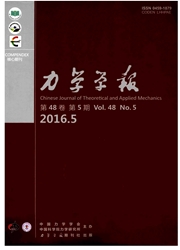

 中文摘要:
中文摘要:
当前国际上实现高焓气体流动的实验手段之一是自由活塞驱动类脉冲设备,包括自由活塞激波风洞和自由活塞膨胀管.采用自由活塞压缩管作为激波风洞和膨胀管的驱动段时,其驱动能力在很大程度上决定了该类设备的性能.本文采用计算流体力学中任意拉格朗日-欧拉方法 (arbitrary Lagrangian Eulerian)数值模拟了压缩管内部的自由活塞运动和气体流动特征.采用移动网格技术来适应活塞运动边界,耦合求解网格运动和气体流动过程,并通过双时间步长方法进行流体运动的时间积分.为了满足几何守恒律(geometric conservation law),对移动网格的法向矢量和表面面积计算进行了修正.不同时刻的活塞位置试验测量结果及欧拉方法预测结果,以及基于简单波理论获得的运动活塞底部气体压力、活塞速度与活塞位置都与当前的ALE方法十分一致.该工作为下一步数值模拟自由活塞激波风洞和自由活塞膨胀管中包括压缩管、激波管和喷管等不同部位的耦合流动提供了基础.
 英文摘要:
英文摘要:
One of the approach obtaining high-enthalpy flow environments is the pulse facility driven by free piston,including free piston shock tunnel and free piston expansion tube. When using a free piston compression tube as the driver part of an expansion tube or a shock tunnel, the performance of such a facility will be determined to a great extent by its driving ability. Numerical simulation of the piston motion and flow properties in the free piston compression tube has been performed by means of an arbitrary Lagrangian Eulerian approach(ALE). Moving mesh strategy was used for the piston boundary adaptation. The motion of mesh and fluid was solved by coupling method. A dual time-step approach developed in computational fluid dynamics was introduced in the construction of ALE time-integrator. The normal vector and surface area of the mesh element for dynamic mesh were verified to satisfy the geometric conservation law(GCL).Both the comparison of piston positions with those of Eulerian method and the comparison of piston base pressures, piston velocities and piston positions with those of theoretical model based on simple wave assumption are very well. This work established the base on which numerical simulation of the flow at different parts for free piston shock tunnel and for free piston expansion tube will be carried out at the next step such as compressor, shock tube and nozzle, etc.
 同期刊论文项目
同期刊论文项目
 同项目期刊论文
同项目期刊论文
 期刊信息
期刊信息
